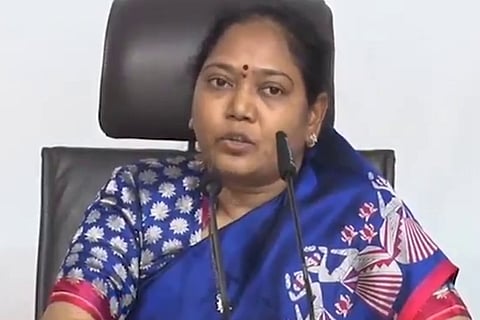

Nalla Ramyasri, a third year engineering student from Andhra’s Guntur district, was stabbed to death by her stalker, Sashi Krishna, in broad daylight, on a busy street, on the morning of August 15. The appalling incident has since led to a political row, with the opposition TDP blaming the YSRCP government of failing to ensure women’s safety, despite the announcement of the much-hyped Disha Bills and related measures like the Disha SOS app. The controversy comes on the heels of the Seethanagaram rape incident, which had also triggered criticism, as it occurred in the vicinity of Chief Minister YS Jagan Mohan Reddy’s residence. While attempting to counter the brickbats and defending the government, Home Minister Mekathoti Sucharita has made some questionable comments over women’s safety.
Speaking to the media after visiting Ramyasri’s family on Monday, Sucharita said that while Sashi Krishna was nabbed based on CCTV footage that captured the attack, the Seethanagaram incident had happened in a place without CCTV cameras, making it difficult for the police to nab the culprits. “We can’t have CCTV cameras in the entire state. This is a reminder that we should also be careful not to go to such remote places. It is not just the government’s responsibility, it is our responsibility too, to avoid going alone to unsafe places,” she said. Her remarks have drawn flak for placing the onus of their safety on victims of gender-based crimes. Comments like these, from other politicians, which try to strip away a woman's right to public spaces have been criticised many times before too.
Following Ramyasri’s murder, TDP leaders, including Nara Lokesh, have alleged that crimes against women have increased under the YSRCP government, claiming that the Disha Bills, which are awaiting approval from the Union government, have remained ineffective. Responding to these accusations, Sucharita also held a press meet on Tuesday, August 17, where she claimed that crimes against women have seen speedy investigation and trial, and more rigorous punishments, in the past two years of the YSRCP’s governance. At the same time, she cautioned young women to be careful when they meet strangers on social media. Ramyasri had reportedly met her killer Sashi Krishna on Instagram, after which he made several advances which Ramyasri ignored, before killing her.
Sucharita mentioned that Ramyasri’s phone was locked and could only be accessed through her fingerprint, which meant no one, including her parents, could monitor it. had kept her phone locked. “Youngsters lock their phones without giving access to parents. Noone can see their phone activities. We cannot ask them not to use phones and social media, but school and college students must use technology to a limited extent. Apparently Sashi Krishna approached her through Instagram, and she might have accepted his friend request. People are saying he was stalking her for two months. If she informed the police or her parents, this may have been avoided,” shifting the focus to internet interactions and asking women to be careful while using social media. She also said that substance abuse might have played a role in the crime.
“Alcohol and drugs are being used by college students, leading to crimes. We are investigating that angle too in Sashi Krishna’s case,” she said, adding that counselling must be provided from school level and subjects like moral science must be brought back into the curriculum. “We don’t know if Sashi Krishna had consumed drugs or alcohol at the time of the incident, but it’s being said that he was an addict,” she said. She also said that alcohol and drugs play a huge role in such crimes, asking people to inform police if they see any addicts.
The Disha Bills and a slew of related measures for women’s safety were introduced by the Andhra Pradesh government, following the brutal rape and murder of a 26-year-old veterinary doctor in neighbouring Telangana, in the outskirts of Hyderabad, back in December 2019. The Home Minister claimed that though the Bills are yet to come into effect, its provisions are being enforced in the state. She said that the average time taken to complete the investigation in crimes against women went down from around 100 days in 2019 to 86 days in 2020, and 42 days in 2021. She claimed that in 1,645 cases booked under the Disha Bill, the charge sheet had been filed within seven days. A database for preparing a registry of sexual offenders is also being prepared, she said, adding that 148 offenders have been convicted as per the provisions of the Disha Bill, with three of them being given the death sentence and 17 of them receiving life imprisonment sentences.
In Ramyasri’s case, Sashi Krishna was nabbed by the police less than 24 hours after the crime was committed, based on the CCTV footage. In the Seethanagaram case, it was only after seven weeks that one of the two accused was arrested, while the second person is still absconding. Sucharita said that with no CCTV cameras at the location, and with the accused being constantly on the move, the case had turned difficult for the police.